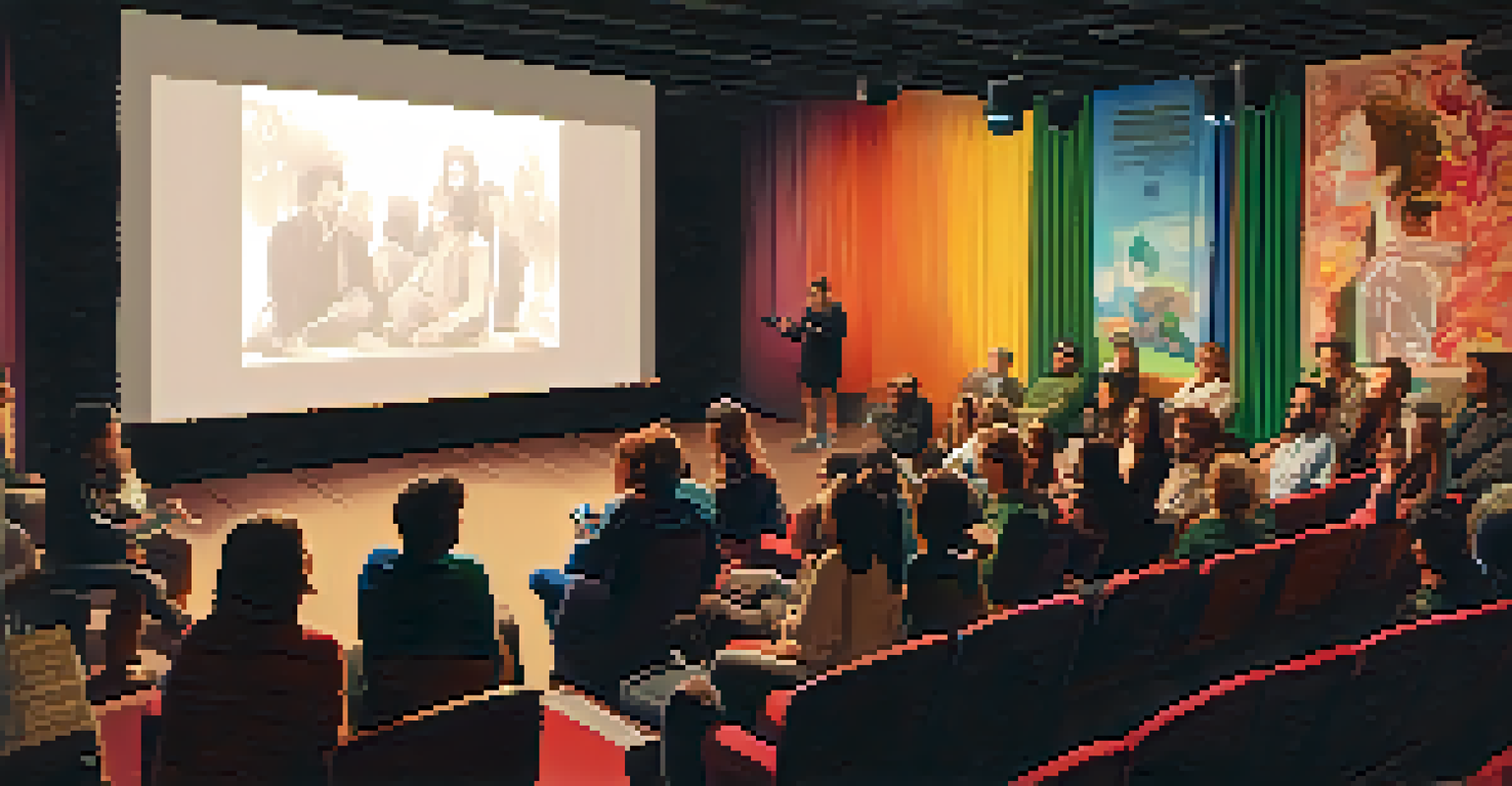Exploring the Role of Film Festivals in Hollywood's Success

Understanding Film Festivals and Their Purpose
Film festivals serve as platforms for filmmakers to showcase their work, often providing a much-needed launchpad for independent films. These events not only celebrate cinematic art but also foster community among creators, critics, and audiences. By bringing together diverse voices, festivals can highlight unique stories that might not find mainstream distribution, enriching the overall landscape of cinema.
Film festivals are the perfect place for filmmakers to connect with audiences and industry professionals alike, fostering a community that celebrates creativity and innovation.
Major festivals like Sundance, Cannes, and Toronto have become essential in promoting new talent and innovative projects. They create buzz around films, attracting media attention and potential distribution deals. For many filmmakers, a successful debut at a festival can lead to increased visibility and opportunities in a highly competitive industry.
Moreover, festivals are often a place where industry insiders gather to network and forge new collaborations. This environment can lead to partnerships that bring fresh ideas to life, pushing the boundaries of storytelling and filmmaking techniques. In an ever-evolving industry, the connections made at these events can be invaluable.
Boosting Independent Films Through Festivals
Independent films frequently struggle to gain traction in a market dominated by big-budget blockbusters. Film festivals offer these smaller productions a chance to shine and connect directly with audiences. By screening independent films in a festival setting, filmmakers can cultivate a loyal following and generate word-of-mouth buzz that can propel their projects forward.

One of the remarkable aspects of festivals is their ability to level the playing field, giving indie films equal footing with major studio releases. Audiences often seek out these unique narratives, which can lead to unexpected hits that capture the public's imagination. For example, films like 'Little Miss Sunshine' and 'The Blair Witch Project' gained traction through festival circuits, ultimately achieving significant commercial success.
Festivals Boost Independent Films
Film festivals provide independent filmmakers with essential exposure and networking opportunities, helping them gain traction in a competitive industry.
In addition to providing exposure, festivals often host awards that can elevate a film's status. Winning or even being nominated for a prestigious award can dramatically increase a film's visibility, leading to wider distribution and viewership. This recognition can make a world of difference for independent filmmakers trying to break into the industry.
Cultivating a Global Audience for Hollywood Films
Film festivals are not just limited to domestic audiences; they attract international viewers and critics, allowing Hollywood films to reach a broader audience. This global exposure can enhance a film's appeal and open doors to international distribution deals. As films are showcased to diverse audiences, they often receive feedback that can shape future projects and marketing strategies.
The beauty of film festivals is that they create a platform for diverse voices to be heard, highlighting stories that often go untold in mainstream cinema.
Additionally, festivals provide a unique opportunity for cultural exchange. Filmmakers and audiences from various parts of the world come together, allowing for discussions about different perspectives and storytelling traditions. This interaction can enrich the filmmaking process and inspire Hollywood creators to explore new themes and narratives.
As Hollywood increasingly looks to international markets for revenue, the role of festivals in nurturing this global audience becomes even more crucial. They serve as a bridge between cultures, helping to cultivate a shared love for cinema that transcends geographic boundaries.
Spotlighting Emerging Talent and Innovation
Film festivals are often the first places where new talent is discovered. With many aspiring filmmakers showcasing their work, festivals provide the perfect opportunity for industry professionals to scout fresh voices and innovative ideas. This influx of new talent keeps Hollywood vibrant and ensures that storytelling continues to evolve.
For example, many renowned filmmakers, such as Quentin Tarantino and Greta Gerwig, first gained recognition through film festivals. Their unique styles and narratives began in these settings, demonstrating how vital festivals are in launching successful careers. Supporting emerging talent not only benefits individual filmmakers but also enriches the entire industry.
Nurturing New Talent and Innovation
Festivals act as launchpads for emerging filmmakers, showcasing innovative projects that keep the cinematic landscape fresh and vibrant.
Moreover, festivals often highlight experimental and avant-garde films that push traditional boundaries. These innovative projects can challenge audiences and inspire established filmmakers to think outside the box. In this way, festivals act as incubators for creativity, fostering an environment where new ideas can flourish.
The Economic Impact of Film Festivals
Film festivals can significantly contribute to local economies, drawing crowds of filmmakers, industry insiders, and film enthusiasts. Hotels, restaurants, and local businesses benefit from the influx of visitors, creating a positive ripple effect throughout the community. This economic boost can be particularly impactful in smaller cities that host festivals.
Moreover, many festivals generate revenue through ticket sales, sponsorships, and merchandise. This funding allows them to continue supporting filmmakers and hosting events, ultimately nurturing the film community. By investing in local talent, festivals help cultivate a sustainable creative ecosystem that benefits everyone involved.
In addition, a successful festival can enhance a city's reputation as a cultural hub, attracting future events and tourism. This long-term impact can lead to ongoing economic benefits as the city becomes known for its commitment to the arts and cinema.
Building Community and Fostering Collaboration
Film festivals are not just about showcasing films; they also create a sense of community among filmmakers and audiences. These events often include panels, workshops, and networking sessions that encourage collaboration and discussion. Such interactions can lead to valuable partnerships and foster a supportive environment for creative expression.
By bringing together diverse groups of people, festivals can spark conversations about important social issues and inspire change. Many filmmakers use their platform to address pressing topics, encouraging audiences to engage with the world around them. This communal aspect adds depth to the festival experience, making it more than just a series of film screenings.
Economic Impact on Local Communities
Film festivals significantly contribute to local economies by attracting visitors and boosting business for hotels, restaurants, and local services.
Furthermore, festivals often celebrate local culture and talent, fostering a sense of pride within communities. By highlighting regional stories and voices, festivals can encourage local filmmakers to pursue their dreams and contribute to the broader cinematic landscape.
Conclusion: The Lasting Legacy of Film Festivals
In summary, film festivals play a crucial role in Hollywood's success by supporting independent filmmakers, nurturing talent, and fostering community. They serve as essential platforms for diverse voices and innovative storytelling, enriching the cinematic landscape. As the industry continues to evolve, the importance of these festivals will only grow.
By providing opportunities for exposure, networking, and collaboration, festivals help create a vibrant ecosystem that benefits filmmakers and audiences alike. Their ability to spotlight emerging talent and address pressing social issues ensures that cinema remains a relevant and impactful medium.

Ultimately, the legacy of film festivals lies in their capacity to bring people together, inspire creativity, and celebrate the art of storytelling. As we look to the future, it's clear that these events will continue to shape Hollywood and the global film industry for years to come.